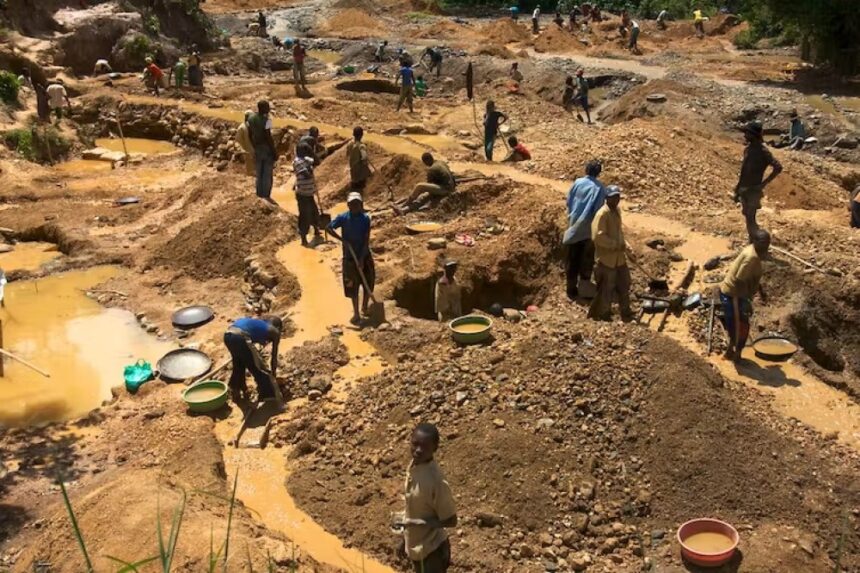Dear reader, permit me to comment on certain remarks about gold and illegal mining (“galamsey”) made by Sammy Gyamfi, the chief executive officer of Ghana Gold Board (GOLDBOD), on this weekend’s Key Points with Alfred Ocansey (Saturday 11 October, TV3).
Claim 1: That GOLDBOD is unique in the law in clarifying that buyers may purchase gold only from licensed small-scale mines in Ghana …
Before GOLDBOD, there was the Precious Minerals Marketing Company (PMMC), as established by the PMMC Act 1989 (PNDCL 219), now repealed. The PMMC Act came hand in hand with the Small-Scale Gold Mining Law 1989 (PNDCL 218).
The intent then was to formalise the sector, so that the PMMC would mop up gold from small-scale miners on behalf of the state.
Among the many objectives of the PMMC Act 1989, Sections 2b and 2d of the law said that the Commission would “buy and sell precious minerals” and “appoint licensed buying agents for the purchase of precious minerals produced by small-scale miners”. NB: Gold is a precious mineral.
Under the law, a “small-scale miner” was generally deemed a licence holder, as outlined then by Section 1 of the Small-Scale Gold Mining Law 1989 (PNDCL 218) – a definition repealed but still upheld by Section 82 (1) of the Minerals and Mining Act 2006 (Act 703).
Hence, it is misleading to seek to create the impression that the Ghana Gold Board Act 2025 (Act 1140) is a novelty that makes GOLDBOD the first body mandated to buy all gold from licensed miners in Ghana, or to make it appear as if previous governments operated in spaces not backed by law.
A vision of reserves
Claim 2: That GOLDBOD buys 20% of the gold produced by seven large-scale mines, and assertions that it is buying gold illegally mined elsewhere are moot …
On 9 August 2022, the then vice-president, Dr Mahamudu Bawumia, engaged the leadership of the Ghana Chamber of Mines at Jubilee House in Accra. The meeting was to get them to sell portions of their gold to the government in accordance with Section 7 of the Minerals and Mining Act 2006 (Act 703), in line with the government’s vision of building gold reserves.
In a letter dated 23 November 2022, Vice-President Bawumia instructed all large-scale mining companies to sell 20% of their output to the Bank of Ghana through the PMMC at no discount, effective 1 January 2023. The same letter made it clear that licensed small-scale miners would also sell the gold they produced to the state to support the programme.
In a July 2025 report, the Ghana Chamber of Mines reported that under the initiative it had sold 358,218 ounces of gold to the central bank in 2024 alone.
Hence, Sammy Gyamfi’s claim to make such gold purchases appear a novelty, started by him, while attacking the previous administration on the same score, is quite misleading.
Proxy wars
Claim 3: That GOLDBOD is not buying gold from illegal mining sources, but rather making purchases from over 2,000 licensed small-scale miners …
I have always said that, from 1963, when the Ghana Diamond Marketing Board (the precursor to the PMMC) was established, right through to today’s GOLDBOD, every government of Ghana has proxied some quantity of illegally mined gold and exported this in return for foreign exchange. I will stand to defend this statement any time.
State reports show that the proportion of gold exports derived from small-scale mining stand on average at 40%. These exports are proxied as production, meaning that we have no grip on where the gold comes from, mainly at the point of export.
By my estimation, over 60% of the total gold declared as produced by small-scale miners is from illegal sources. My definition of illegal sources includes unlicensed mining operations in restricted and non-restricted areas, areas where producers use licensed but unjust methods of mining, proxy of output from illegally mined areas in the name of certain licensed areas, and so on.
Check the Minerals Commission, the state regulator of mining. It cannot account for even 30% of the gold declared by GOLDBOD. Well, poor production record-keeping by licensed holders, and many non-functional valid licences, may account for some of the discrepancies, but the rest cannot and can never be accounted for by the Minerals Commission. There is a huge difference between what is declared and what is purchased by GOLDBOD. That deficit is made up of gold produced through illegal mining.
Hence, the fact remains that GOLDBOD’s purchases include a chunk of produce from illegal mining sources.
President John Dramani Mahama recently said it is better that the state acting through GOLDBOD should buy the gold illegally mined in Ghana, than that the output of galamsey be smuggled. You could summarise the principle as “Economic policy over environmental protection policy”.
Why hasn’t GOLDBOD listed the sources of its gold, as guidelines from the Organisation for Economic Co-operation and Development (OECD) on responsible mining require, but rather listed the buyers? Gold isn’t mined in gold shops: it comes from mines. GOLDBOD itself hasn’t showed where its gold comes from.
If the chief executive officer of GOLDBOD will attack people as liars, he should immediately produce data on all the licensed small-scale mining firms his organisation buys from. You can’t use licensed buyers as a proxy for buying from licensed gold mines: it is misleading and must not be allowed.
GOLDBOD’s website cites the board’s sources as “Ashanti, Eastern, Western Regions”. Which small-scale mining firm goes by any of these names?
And on buying from 2,000-plus miners …
Now the current government claims it hasn’t signed any small-scale mining licences since it assumed office, but jubilates that small-scale mining accounts for 52% of the total gold produced in-country.
Since each small-scale mining licence runs for five years, and the NDC last left office in 2016, it means all the 2,000-plus licences of miners from whom Sammy Gyamfi claims he is buying were either renewed by the NPP government or granted by the NPP in the past eight years.
Are these licences the same as the ones for operators we were told on Saturday are engaging in illegalities, and which have led to an increase in galamsey? So what is stopping the government from revoking those licences? All of a sudden, all those small-scale licences are operating well and feeding GOLDBOD’s coffers as they should?
Sammy Gyamfi claiming that GOLDBOD is buying output exclusively from over 2,000 licensed small-scale miners is not only false, but an insult to Ghanaians. We are all hoping we can come together to regulate small-scale mining and mitigate the problem on Ghana’s hands. But even if this were true, where are the licensed miners located, and what is their production record?
To attack previous administrations for granting mining licences and allege this is the factor that has perpetuated illegality, all the while hiding behind the same demand purchase – apart from the environmental implications for the lungs of this country – is both hypocritical and worrying. So is attacking people with dissenting views on the subject.
Claim 4: That Gold4Oil and Gold4Reserves worked on a non-licensed basis …
On Gold for Oil and Gold for Reserves: the previous government, working through the Bank of Ghana, outdoored the Responsible Gold Sourcing Policy Framework of the Domestic Gold Purchase Programme, which outlined all the legal sources of gold and every guideline set out under the OECD principles on responsible sourcing.
It is instructive to state that Bank of Tanzania, the country’s central bank, understudied this same material to establish Tanzania’s gold buying programme in October 2024.
Before the formal establishment of GOLDBOD, its staff also relied on the same information to prepare many of its reports. Consequently, it would be misleading for the chief executive of GOLDBOD to suggest that there wasn’t a proper framework outlined by Bank of Ghana to source.
Conclusion
We must accept that, from time immemorial, illegally mined gold has obtained proxies to pass as legal and has been exported for gain.
Sammy Gyamfi has no moral right to attack Kofi Bentil, vice-president of IMANI-Africa, and to call him a liar for stating the reality. Sammy Gyamfi saying GOLDBOD doesn’t buy galamsey gold contradicts his own boss, President John Mahama, and rather makes him appear a liar in the eyes of Ghanaians.
Traceability of gold doesn’t derive from gold shops – it must come from the mine gates, and we must be truthful to ourselves. The previous administration launched plans on traceability under the Ghana Landscape Restoration and Small-Scale Mining Project with World Bank sponsorship.
The fight against illegal mining cannot be won if state officials lie about the problems.
Ing Wisdom Gomashie
This is an edited version of a Facebook post by Wisdom Gomashie, a mining engineer, consultant and former ministerial special assistant in the Ministry of Lands and Natural Resources




